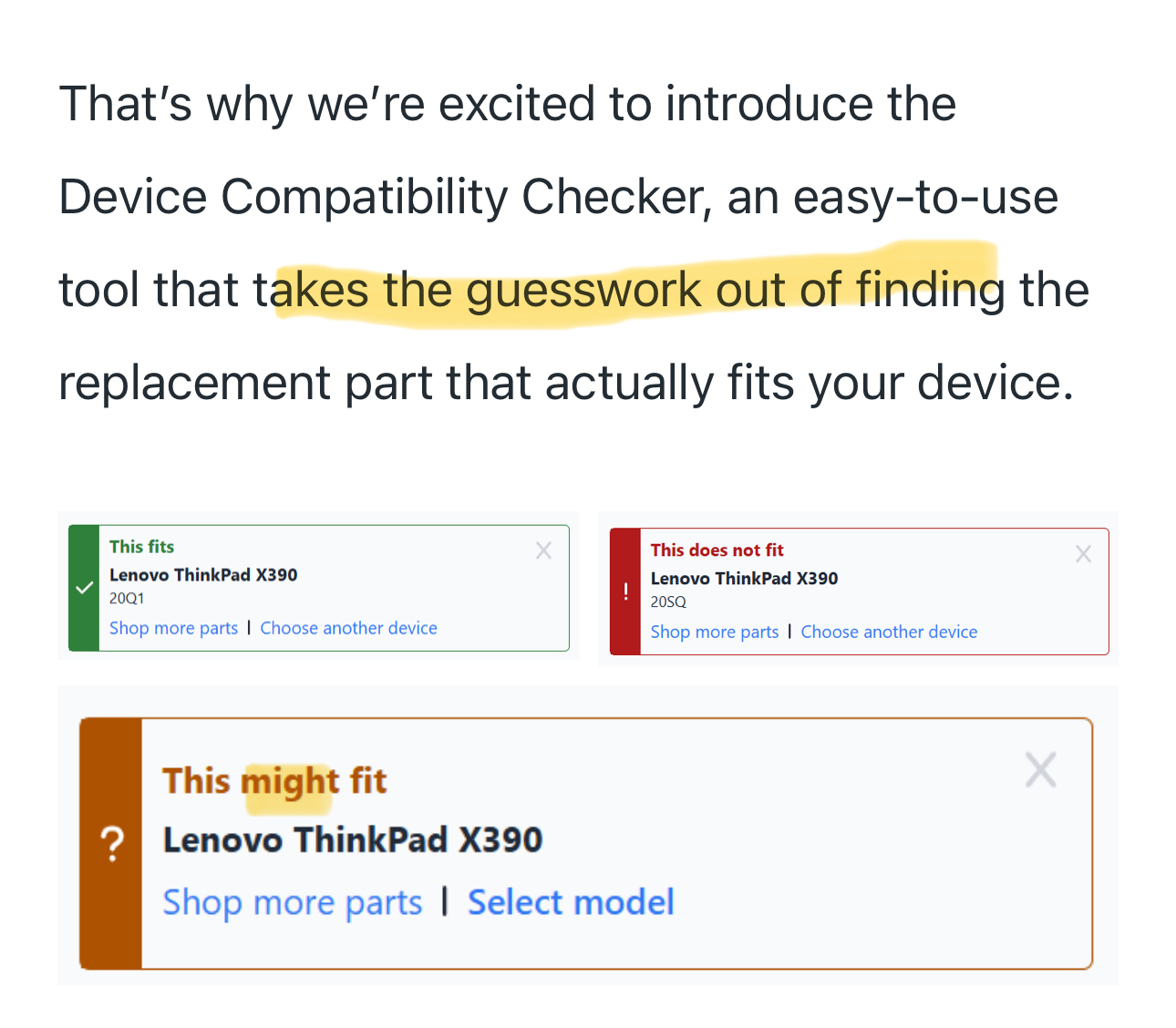

Advanced tech? What advanced tech? People watching you on cameras? The highest rate of wake word false positives? Something else I’m too dumb to understand?


Advanced tech? What advanced tech? People watching you on cameras? The highest rate of wake word false positives? Something else I’m too dumb to understand?




Jokes aside this is fucking rad and a continuation of great things from them. I really dread the day iFixit enshittifies.


I use uBlock Origin to remove tracking. I also manually remove tracking. Privacy Badger is a tool that works to explicitly do this kind of tidying.


Your analogy doesn’t work at all.
If one of the core harms is the removal of income and tracking, ad blockers fall into this category. Ad blockers very explicitly remove these things. The harm is not “Honey stole my income” it’s “Honey removed my tracking and Honey added their tracking.” Read the Legal Eagle case.


I am genuinely concerned about this because Legal Eagle’s suit is directly tied to manipulating URLs and cookies. The suit, even with its focus on last click attribution, doesn’t make an incredibly specific argument. If Legal Eagle wins, this sets a very dangerous precedent for ad blockers being illegal because ad blockers directly manipulate cookies and URLs. I haven’t read the Gamer’s Nexus one yet.
Please note that I’m not trying to defend Honey at all. They’re actively misleading folks.
Are you looking for an editor that can format YAML out-of-the-box or with plugins? In my experience, most editors only support a small number of formats out of the box and extend that functionality with plugins. I have yet to find a solid, production editor without a decent YAML formatter. If you’re using one of the common commercial ones, Red Hat maintains many that work explicitly for Ansible.


Undercover FBI agents later made contact with Yener and convinced him they wanted to help him carry out an attack, it says. They tracked Yener throughout the summer and into the fall.
How the fuck this isn’t entrapment has confused everyone for decades. A convincing argument can be made that the current US right-wing terrorist problem only exists because 75% of those chucklefucks are informants interested in entrapment so it doesn’t surprise me they’ve expanded outside the white power movement.


I have more important things to do than to lobby the government to send a tax bill.
Why would the CEO be dumb enough to say this in an interview? If your business model is fucking people, your CEO has to have a cool head when asked if he’s fucking people!


Anyone in tech who knowingly works for Google supports these things in the same way that anyone that works in tech who knowingly works for Meta support genocide and the erosion of the democratic process. I give the caveat “in tech” because there are some roles like content moderation or executive assistant where you really don’t have the luxury of a huge market working almost anywhere else that doesn’t support genocide and I don’t fault those faults for taking a job that has better benefits. My engineering peers? I judge them for it.


The Security Online article only cites Margitelli’s post on the matter. My assumption has been the article used the post as its single source. On one hand, watching MS fuck shit up for years, I want to believe Margitelli. On the other hand, researchers using weird tools and uninterested in reality are why curl is now a CNA.
I’m personally frustrated with Margitelli’s post because it’s all about abandoning responsible disclosure globally rather than naming and shaming (Canonical? Red Hat? Both? Others? If it affects all GNU/Linux I’d expect every single distro maintainer to be named and shamed). Responsible disclosure is our best solution to make sure innocent bystanders don’t get caught in the crossfire. When specific entities don’t abide by responsible disclosure we lambast those specific entities not the entire process built to keep users safe.


This is complicated to unravel and has lots of similarities to the Tri-State Crematory Scandal.
Who owns a dead body? Does the state? Does the family? Take religion out of the picture for a few minutes as well so we can properly separate church and state. Someone dies without (available at that moment) relatives or a will defining what happens with the body. Alternatively someone dies and has not actually paid for the stuff stipulated in their will and does not have the resources to do so. What should happen? Something possibly like, in order,
Dead bodies can’t just sit around. They can cause serious health and environmental problems if not properly disposed of, so something has to be done. Remember, we’ve set aside religion, so a dead body is literally just a resource. It can be turned into cremains, it can be buried, or it can be sold for various uses. What should the state regulate here? What’s wrong with the state turning a dead body into some money? How much responsibility do families have in respecting last wishes? How much time and effort should the state put into investigating those? Do dead bodies really matter? How much land are we willing to turn over to cemeteries today? In ten years? In one hundred years?
Now if you bore with me this long and agree that dead bodies can be sold, I also strongly feel like there should be compensation to these families with interest for that shit. If you steal my resources and don’t tell me, the state already requires repayment. That’s what should happen here. It gets murkier once you add religion back in because you can’t really undo a lot of these things.
Dallas County is doing something wrong. But it’s way more complicated underneath the hood than normal Texas government shenanigans.


The reason to use mono over dotnet is political. This is stirring up some really old shit; I expect a continuation of that shit now. Mono is currently MIT as is dotnet core. Who knows what direction each project will go now? MS has a history of fucking with licenses and Wine uses copyleft setups.


Microsoft has had dotnet-core for awhile. If you are running production dotnet loads (eg a C# app), you’ve probably been using those Linux containers for awhile. This doesn’t surprise me; they usually aren’t interested in maintaining an open version of software they have more restrictive licenses for. Enterprises will continue to use dotnet-core and Microsoft will probably do something to shoot mono in the foot in a few years.


It’s even more funny because there’s so much stuff that really doesn’t belong in museums if you talk to curators. The average person thinks a Picasso would go for millions and be on display anywhere; there are sketches Picasso did that only have value because Picasso drew them not because they’re good Picassos or moving art. This piece has a good perspective. If we hoarded everything ever we’d get to the point where future generations couldn’t make any new art because there would be no space.
I will never be able to actually touch one of these gems because no museum would let me. At the end of the day there’s not much difference between me flying across the world and standing in line with a bunch of people taking shitty selfies in front of a ton of protective glass to catch a glimpse of one side of this gem and seeing a virtual scan I can move around. Digitize it, send it back where it came from, and look toward new art.


This is from April. Did something change with it?
Consultancies don’t exist for improving companies; they exist to make the rich richer while giving some semblance of things like fiduciary duty.